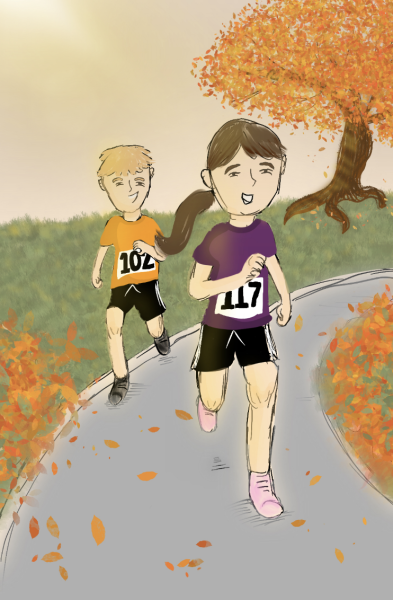Roar of friendly crowds leads athletes to victory
Dissecting the advantages of playing on your own home floor
Boys basketball team celebrates during a timeout against Prospect.
It’s one hour before the big game: the biggest one of the season. As you step off the bus, you do your best to try to focus in preparation for one of the largest moments of your career. However, you cannot focus. Why? You’ve been sitting on a bus to an away game for the past two hours. After going through the panic of getting ready to go in the sub-par locker room, followed by being “welcomed” onto the field by a passionate opposing crowd, you finally get to play. However, throughout the game, the opposing team receives multiple calls in their favor while your team struggles, leading to the game to be lost. Is this just a coincidence? Or is the concept of home and away games set up to put teams at an unfair disadvantage?
No matter what teams are competing or what sport is being played, the home field advantage is a universal term. From individual sports such as tennis to team sports such as football or basketball, playing home games presents a unique set of advantages that can make the difference between success and failure at all levels. There are three main aspects to the home field advantage: crowd, facilities/weather, and referees. The first aspect, the home team’s crowd, is a very misunderstood concept. It is a common misconception that having to experience a large opposing crowd as the visiting team can affect sports performance, but these crowds have a very minimal effect on athletes at both collegiate, professional, and high school level. However, a large crowd can do great benefits in helping the home team’s spirit.
“The main thing it does is make you…comfortable,” said sophomore Elliot Heckard. “Having a group of people cheering you on…is a big confidence booster, which helps performance…Besides, it gives you a chance to look good in front of everyone.”
The idea of wanting to play well in front of family and friends plays a major role in a team’s positive performance at home games and can cause negative impact during away games.
“It is disappointing to show up to an away game for the team and see almost no one in our stands,” said junior Luca Cutinello. “It doesn’t change the way I play, but
it is in the back of my mind throughout the game.”
Beyond the crowd difference at home and away games, the difference in facilities or fields can cause an impact on teams. The
most notable issue: the travel times in order to actually reach the other team’s field. Even at high school levels where the longest travels tend to be around two hours, the concept of sitting in a bus in traffic for extended periods of time plays a major role on how an athlete feels going into a game. Furthermore, differences in fields can present an unknown or different environment that can make some athletes nervous.
“I definitely enjoy playing at home more,” said Elliot Heckard. “It’s so much easier to get to the area…[and] you’re very familiar with the place.”
At higher levels of athletics, differences in weather conditions can have a large impact on a visiting team, but this is not as notable at high school levels.
Coming in at the most controversial aspect of the home field advantage is the referees. While teams and individual athletes are very quick to point the finger at referees after losing an away game, referees tend to be biased towards the home team due to numerous statistically proven reasons. For far away games, the geographical positioning may make referees inclined to make calls helping the home team.
“I feel that far away visiting games tend to have referees that make calls biased in the home teams favor,” said senior Andrew Phoy. “Whether that is because they know the team or simply are from the town, I don’t know.”
However, there is another factor affecting referees. According to “The Influence of Social Forces: Evidence from the Behavior of Football Referees,” the proximity of a crowd in accordance to the field affected the number of calls that the home team received. The closer the crowd was, the more biased the referee was towards the home team. In some cases, the extra penalties or fouls awarded due to these penalties could lead to whole points being added to the scoreboard for the home team.
With all things considered, the home team definitely does possess an advantage, but it changes from game to game depending on the scenario at hand. Being able to recognize and adjust to the home team advantage, whether you are visiting or home, can make the difference between getting the extra point to win the big game of your season.
Your donation will support the student journalists of Saint Viator High School. Your contribution will allow us to purchase equipment and cover our annual website hosting costs.








